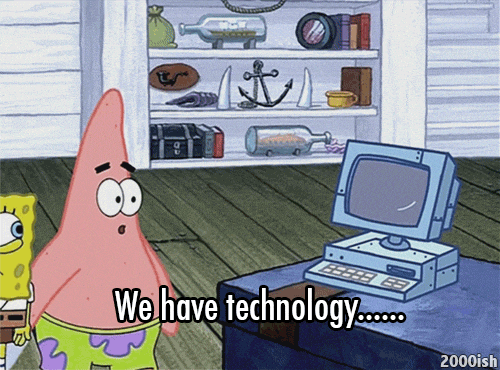Everyone gather round, and see the new Robo-marketer 2000! It's got hyper-personalisation speeds of 200 miles an hour, can eat data and spit out insights, and even comes with a microwave! It's all your office needs!

At least that's how I pictured the convergence of deep learning and marketing when I first heard about it. I guess it's not far less futuristic, really.
We all know that effective use of data is critical in this industry. It means the difference between a successful campaign with long-term relationships, and one that flops. So, using AI and machine learning are vital to utilising analysed data and insights, at scale. We all know we're not exactly strapped for data, but what you do with that data, and how you deal with it, is key.
So, basically, deep learning is a means of predication and analysis on a vast scale. Through this, companies are using advanced AI to deliver hyper-personalised experiences to their customers, predicating what they want to an unprecedented degree.
Netflix, for example, has an AI-driven personalisation, with its recommendation system influencing about 80% of what its users watch. I mean, it must be good because the streaming platform estimates that its algorithms help it save $1 Billion annually in customer retention.
So, we can see the benefits. But before anything else, we need to ask:
What is Deep Learning?
Deep learning, or machine learning, is an AI-driven technology, which relies on gathering user data to learn behaviour patterns. This means utilising analytic data and AI to create algorithms, which leads to smarter marketing.
It does this by mimicking the human brain, by using 'neural networks'. To create these networks, the AI will perform a task again, and again, in a slightly different way each time, learning variants and differences. This means it's learning, like a human does, based on experience. But unlike a human, it can do it at an unprecedented rate.

This leads to quicker problem solving, massive amounts of data being processed, and skills being learnt in a much smaller time frame.
An example of this is the "Predictive Vision" experiment, conducted by researchers at MIT's Computer Science and Artificial Intelligence Laboratory. The scientists trained the deep learning system to predict the actions of characters in TV shows. After observing more than 600 hours of YouTube videos, the AI was able to predict whether the characters would hug, kiss, shake hands, or high five 43% of the time. This is compared to the 36% of previous algorithms.
So, you can probably see how this could be beneficial for marketers, in predicting what their customers will do next. It allows brands to gain a more complete understanding of how their customers will react and, more importantly, purchase.
Deep Learning and Marketing
Marketers tend to use deep learning to:
- Recognise speech
- Analyse images
- Track movements and attention
- Determine what content to publish
- Communicate with their customers
- Process language
- Predict behaviours
- Target customers
And some examples of deep learning, in practise, can include:
- Automatic image captions
- Chatbots using natural language processing
- Real Time Bidding software for buying ad space
- Automatic translation
- Automatically generated copy
So, these are some pretty common and recognisable examples - nothing too far flung or sci-fi. Many marketing automation solutions and customer interaction tools already use some of these deep learning applications. But, it's likely that these will become a more frequently used, and standard, part of marketing software.
How else can deep learning help marketers? Well, it can improve:
Audience Identification
One of the Big Questions for marketers is "who exactly is my target audience?". The other is "who is stealing my sandwiches from the communal fridge?". In fact, these two answers may overlap.
By looking through purchase data, engagement metrics etc. etc., a deep learning algorithm will be able to see the characteristics that make an individual more likely to engage with your brand.

It can even analyse consumer shopping habits to see under what conditions people are more likely to make a purchase, and the type of product that person likes to shop for.
And big names are getting involved: Facebook is looking into deep learning AI to learn more about its users, and Salesforce has acquired AI start-up MetaMind in order to build a smart CRM.
Personalisation
Personalisation is top of the pops for consumers. In fact, Accenture showed that 91% of consumers prefer brands that remember who they are, and provide personalised promotions and recommendations. Plus, over half of consumers are happy to leave a brand in the dust if they don't get a personalised experience.
So, deep learning combines with personalisation to enable "hyper personalisation".
The growth of Internet of Things means marketers can collect huge amounts of data about potential customers. All this information means that marketers are going to have access to a number of ways to communicate with customers on a hyper personalised level. But with this level of data, comes the need for a super-human ability to process it all.

Some large companies have been using AI algorithms in a similar way, such as Amazon. The e-commerce giant uses AI algorithms to take into account the purchase history of users, the items in their carts, and even their viewing habits. This data is then turned into product recommendations. This algorithm could even be used to send these recommendations at the exact right time they'd be likely to convert.
Data and Insights
"Deep learning is notorious for being a black box when it comes to insights, but effectively reverse engineering algorithm outputs is not impossible for a strong data science team," says Jeremy Fain, writing for Forbes.
"Having this ability allows brands to identify many more clusters of people they should be targeting, when and how best to do it, and which products that person is more likely to buy. In other words, deep learning can help marketers do their jobs better than ever before."

Deep Learning can take a bunch of different pieces of information, from a bunch of different sources, and process it in a way that is effective and insightful. Plus, alongside this attention to detail, an algorithm can do this on an unparalleled scale. Other systems cannot do this to the level of deep learning. Plus, DL is completely customisable, depending on a company's needs and the data they have.
Prediction of Consumer Behaviour
Combining data and deep learning leads to a personalised marketing approach, we know this much.
But deep learning can also have the ability to find "patterns inside of patterns," says digital marketing expert Reshu Rathi. This basically means that businesses will be able to understand customers intimately.
Researchers at Renmin University of China found that info about customer hobbies and work situations, when used as DL inputs, helped predict the automobile purchase intent and preferences of different groups of consumers.
Customer behaviour is a science. And prescriptive analytics is but another technique that uses DL from customer data to predict future trends and behaviour patterns.
MAPs (marketing automation platforms) have become powerful enough to understand, because of this, when a customer will purchase, what their life time value is, and what is the right discount to offer to a customer segment.

